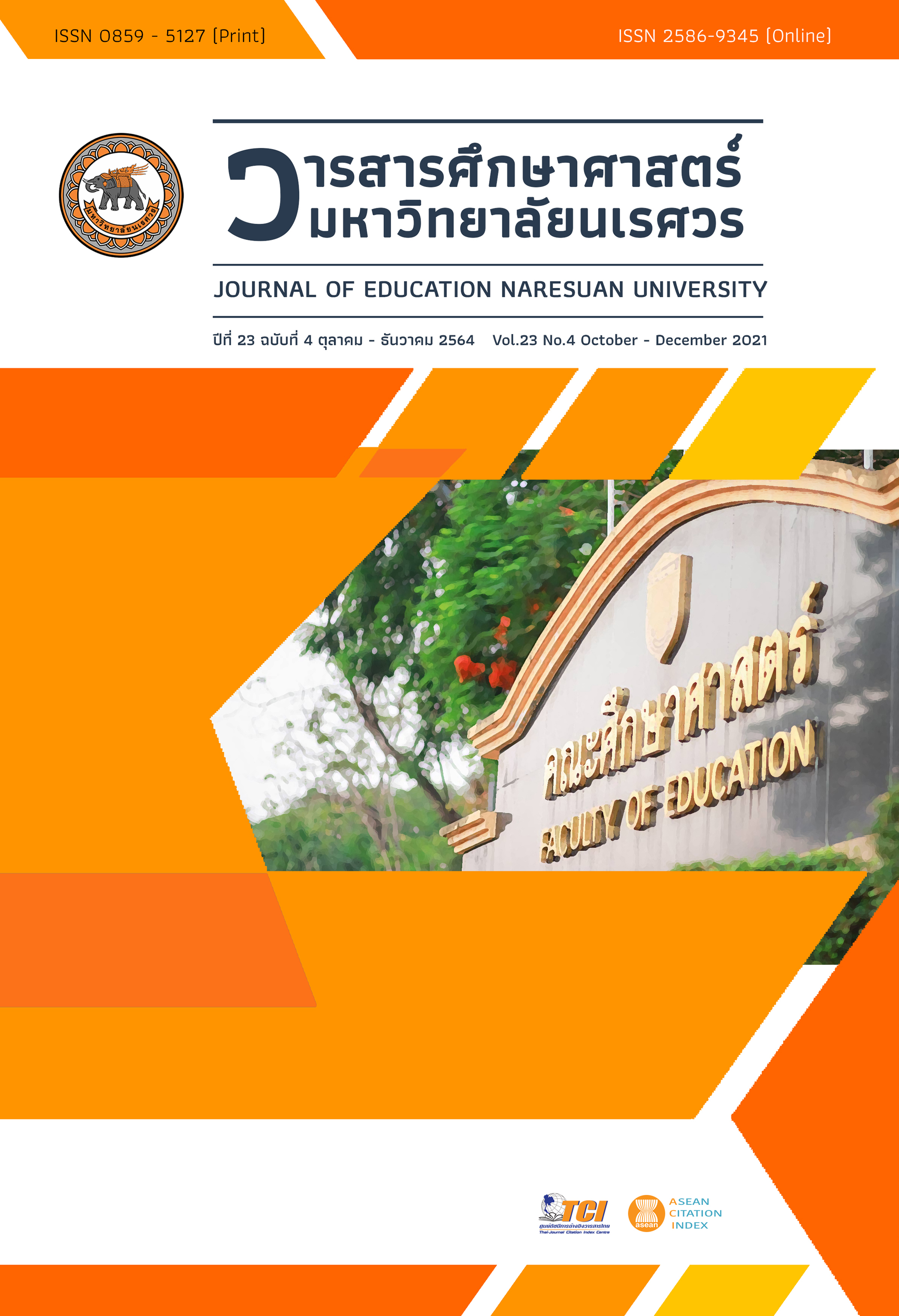AN ADMINISTRATIONAL MODEL FOR SCHOOL ADMINISTRATORS IN PRIMARY SCHOOLS HAVING URBAN REFUGEE AND ASYLUM SEEKER STUDENTS รูปแบบการบริหารสถานศึกษาของผู้บริหารสถานศึกษาระดับประถมศึกษาที่มีนักเรียนผู้ลี้ภัยและผู้ขอลี้ภัยในเขตเมือง
Main Article Content
Abstract
This research was conducted by mixed methods research and aimed to develop an administrational model for school administrators in primary schools having urban refugee and asylum seeker students. The methodology included three steps: 1) Studying the state of school administration of administrators in primary schools having urban refugee and asylum seeker students through related research and documents along with interviewing 5 experts, 2) Developing an administrational model for school administrators in primary schools having urban refugee and asylum seeker students by using the information from Step 1 to create questionnaire and collected the data from 486 samples in 96 schools consisting of school directors/deputy directors, chief of school subdivision and heads of the school department and then analyzed by confirmatory factor analysis (CFA), and 3) Evaluating and Certifying an administrational model for school administrators in primary schools having urban refugee and asylum seeker students though by 17 experts. The statistics utilized in this research were percentage, mean, standard deviation, confirmatory factor analysis (CFA), and content analysis and analytic inductive were also conducted. The results of research were found that:
1. An administrational model for school administrators in primary schools having urban refugee and asylum seeker students consists of 3 main components: inputs, process and output. The state of school administration in learning contents and learning activities is obtained from Ministry of Education which is irrelevant to race, belief, culture, language, and way of life of students.
2. An administrational model for school administrators in primary schools having urban refugee and asylum seeker students consists of 3 main components: 1) Input, consisting of 1.1) Educational Personnel and students’ parents, 1.2) General administration, 1.3) Budgeting administration, 1.4) Academic administration, 1.5) Mission and State Policy, 1.6) Human Resources administration, and 1.7) School Culture and Environment. 2) Process, consisting of 2.1) Multicultural educational administration, 2.2) High Expectation Teaching, 2.3) Qualified curriculums and Learning, 2.4) Reinforcement and Motivation, 2.5) Educational administration based upon 4 sublime states of mind, and 2.6) Command and Control. 3) Output, consisting of 3.1) Learning achievement, 3.2) Efficiency of School Administration, and 3.3) Desirable Characteristics and Performance of students.
3. The developed system model was evaluated and approved in accuracy, propriety, feasibility, and utility by the experts at the highest average standard level.
Article Details
The owner of the article does not copy or violate any of its copyright. If any copyright infringement occurs or prosecution, in any case, the Editorial Board is not involved in all the rights to the owner of the article to be performed.
References
EFQM. (2010). The European Foundation for Quality Management Excellence Model. Retrieved October 9, 2010, from http://www.efqm.org/en/
Esteghamati, A., Zandieh, A, Khalilzadeh, O., Meysamie, A., & Ashraf, H. (2010). Clustering of metabolic syndrome components in a Middle Eastern diabetic and non-diabetic population. Diabetology & metabolic syndrome, 2(1), 1-8.
Gall, M. D., Borg, W. R., & Gall, J. P. (1996). Educational research: An introduction (6th ed.). New York: Longman Publishing.
Glickman, C. D., Gordon, S. P., & Ross-Gordon, J. M. (2001). Supervision and instructional leadership a developmental approach (5th ed). U.S.A.: Allyn and Bacon.
Intragumhaeng, P. (2001). A model of alternative education for disadvantaged children on highlands in the Upper North of Thailand. Journal of OBEC ministry of Education, 4(11), 34. [in Thai]
Office of the Basic Education Commission. (2007). Guidelines of decentralization of administrative and educational administration for the committee of educational service area office and schools in accordance with the ministerial regulations prescribing rules and methods of decentralization of educational administration and management. Bangkok: The Agricultural Cooperative Federation of Thailand. [in Thai]
Office of the Permanent Secretary, Ministry of Education. (2017). Handbook and guideline of educational management for persons who do not have a civil registration and non-Thai nationals (new revised edition 2017). Bangkok: Office of the Welfare Promotion Commission for Teachers and Educational Personnel Printing. [in Thai]
Sammons, P., Hillman, J., & Mortimore, P. (1995). Key Characteristics of effective schools: A review of school effectiveness research. London: Institute of Education, University of London.
Sanrattana, W. (2001). Comparison of principles of research, administration, and development for application. Journal of Education Khon Kaen University, 25(1), 8-15. [in Thai]
State of Victoria (Department of Education and Training). (2002). Knowledge and skills building a future. Retrieved from http://www.sofweb.vic.edu.au/blueprint/esdefault.asp
Sukthawee, A. (2010). Administrative factors and administrative behaviors regarding grade span configuration in secondary schools and educational expansion schools (Doctoral dissertation). Bangkok: Kasetsart University. [in Thai]
Suwannasuan, W., Chaiyakit, M., Markshoe, P., & Thamrongsotthisakul, W. (2013). A model of Alternative Education for Disadvantaged Children on Highlands in the Upper North of Thailand. Journal of Education Naresuan university, 15(Special), 182-192. [in Thai]
Vungsriphisal, P. (2010). A Development of educational model and guidelines for immigrant student case study: Mae Sot district, Tak province (Research report). Bangkok: Office of the Education Council Ministry of Education. [in Thai]
Yongyuan, B. (2010). A development of multicultural education model in elementary school. Bangkok: Office of the National Culture Commission Ministry of Culture. [in Thai]


